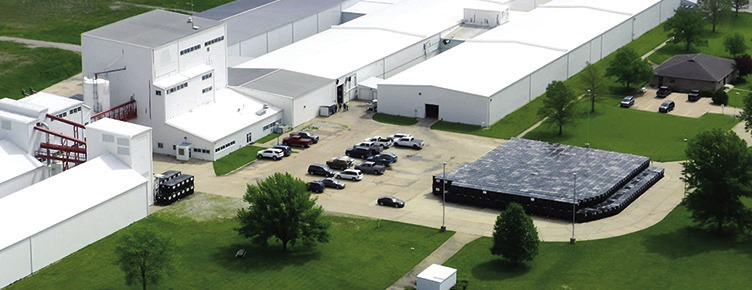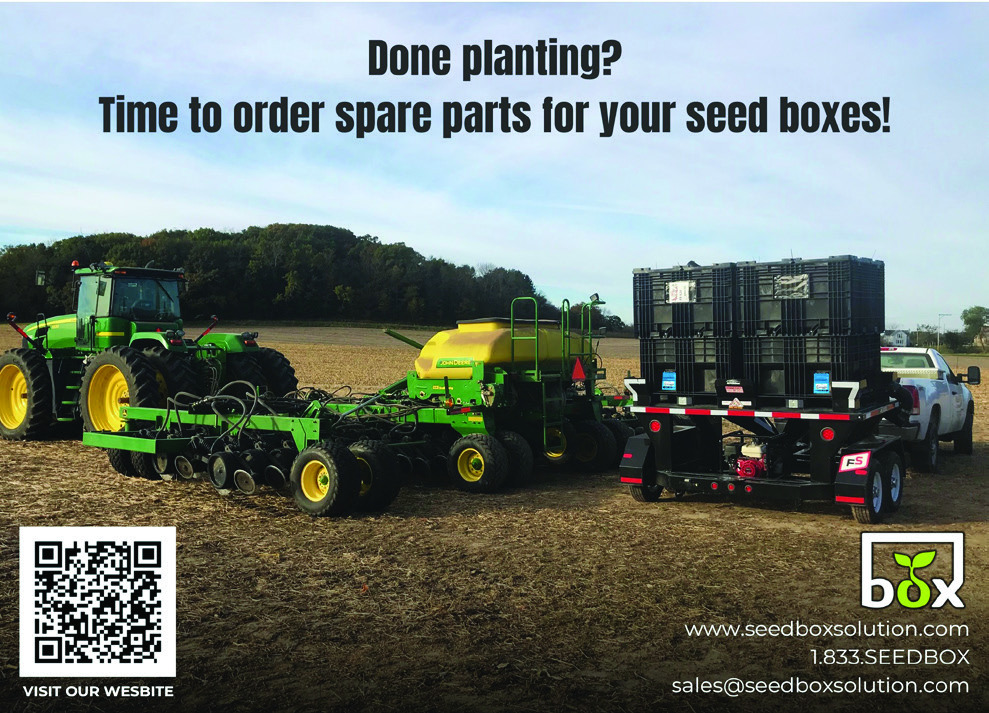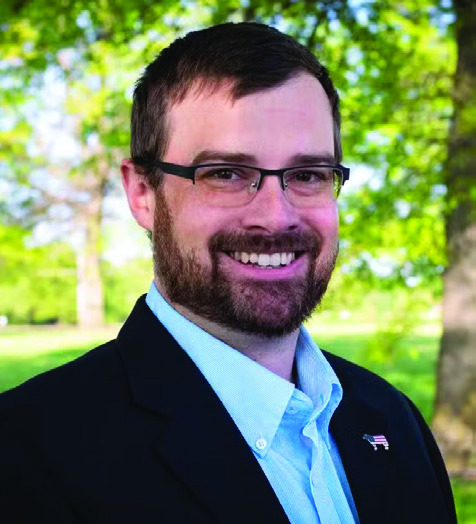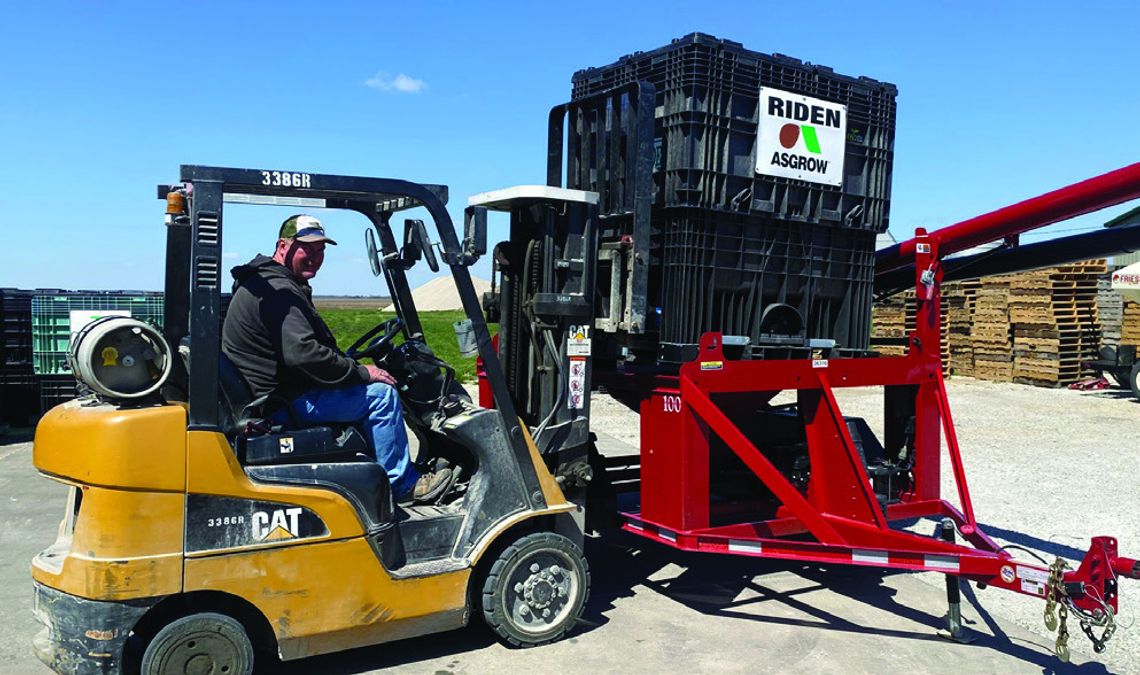GOOD HOPE - If one is traveling down Highway 9 east of the Good Hope junction, they will eventually pass a couple of large buildings on the left that was once Pioneer Hi-Bred International.
Pioneer, however, decided to close in 2015, mainly due to a loss of growing acres and the plant's location on a 2-lane highway. The closure of Pioneer led to a loss of 50-60 jobs in the area and when Remington Seeds purchased the Good Hope facility, they left only a few men to maintain the plant. A major blow to McDonough county, the Pioneer plant was mainly used for storage-a negative impact on the local economy. Remington Seed bought six other Pioneer facilities at the same time, opening a handful back to full operation.

Early in the year 2020, before the now famous Covid pandemic, a young Bushnell area man named Quintin Bucher was feeling some angst about his career path. A husband and father, Quintin had a job he loved with Sullivan Show Supply, a company based out of Iowa that proudly serves the livestock show industry with needed supplies.
Quintin, who is a great-grandson to the legendary Miles McGrew, was raised in the shadow of the famed McGrew Belgian Horse barn on the Walnut Grove Blacktop (Greentop Farms). Bill McGrew's grandson, at a young age he was indoctrinated into the world of horse shows, farming, and cattle.
The job selling show supplies was one Quintin loved as he enjoyed immensely working with the young kids as they groomed and showed their livestock.
But Quintin was feeling some inner turmoil. The Sullivan job took him away from home, away from his family, many times on weekends and even holidays. He needed a different, more stable job-one where he could be at home more. But little did he know what was in store for him.
When Covid hit in early 2020, many upcoming fairs, livestock shows and conventions were canceled. Mr. Bucher's job as a traveling salesman to the livestock industry came to a screeching halt.
Almost as if by divine intervention, Quintin came across an advertisement that was so intriguing that he applied immediately.
A company named Seedbox Solution was looking for a Plant Manager-in Good Hope, Illinois no less. It must have appeared too good to be true to Bucher.
Within three weeks Bucher was the new Plant Manager for Seedbox Solution, a small but expanding company that specializes in the cleaning, repair and recycling of thousands upon thousands of plastic 'totes' that hold treated seeds ready for planting.
These boxes, usually black, are quite large. For example, one might be 56' long, 45' wide, 62' tall with the lid on, and is collapsible to 36' when empty. A box, if one wanted for some reason to buy one, would cost around $560 and weigh around 330 pounds.
The seed boxes have replaced the old paper sacks that those of us who grew up on farms remember our grandfathers and fathers lifting out of the backs of pickup trucks. They had to be carried to the planter, opened and dumped into the planter boxes. Backbreaking manual labor.
Each modern seedbox today can hold the equivalent of 40-50 old paper bags of seed, and each full seed box can have a monetary value up to $30,000.
The 36-acre Good Hope plant employs 40-50 people working two shifts, Monday- Friday. First shift runs from 6am-2:30pm and the second shift runs from 3pm-11:30pm. The Good Hope facility alone has the ability to process 112,000 seed boxes per year.
The boxes can be rented or purchased by the major seed companies, who in turn disburse them to the farmers. Because the seeds are specifically treated, the boxes upon return must be intricately cleaned and inspected before being used again. One treated seed left behind could contaminate a large amount of the product.
The Seedbox Solution site east of Good Hope uses so much water to clean the boxes that it has its own large well. The facility has multiple buildings for both cleaning and storage and Bucher's eyes light up with the possibility someday of adding more space and maybe even a third shift of employees.
In layman's terms, the giant seed boxes are run through a tunnel similar to a car wash with this process spraying 100 gallons of water a minute, the water is recycled to limit the overall consumption due to the use of a well. They also use robotics to scrub and pressure wash the inside of the boxes. As an end safeguard, an inspector checks each box thoroughly by running a clean 'baby wipe' over different areas in the box. If any 'color' shows up on the baby wipe, it is a sign that some seed treatment chemicals are still present in the box. For that box, the cleaning process starts over.
While I am making the cleaning process sound simple, it definitely is not. Used boxes are returned through meticulous scheduling so as not to overwhelm the plant. Semi's are constantly seen hauling dirty boxes in and clean boxes out.
Boxes have moving parts that are inspected and if need be, are welded or replaced. A box that is ready for recycling will be stripped down with all metal and wood being removed.
It is interesting to know that prior to the boxes being made of plastic, a different system was used. Large cloth bags with straps were used to hold the seeds and they were moved around by machinery. One day a strap failed, and a seed company worker was killed (not in this area). This led to a desire to have a safer system.
The backbreaking work our ancestors did lifting heavy bags of seed every spring is now mostly done by machinery. The large seed boxes are lifted by forklift onto a 'tender'. The tender has an auger that removes the seed from the seed box and deposits it into the planter boxes.
When driving by Seedbox Solution today, east of Good Hope, one will see a huge wall of black seed boxes. Quintin explains that these are the 'dirty' boxes that have been returned after spring planting.
Bucher, who in the fall of 2020, was promoted to the position of Operations Director for Seedbox's service business, stated he would be remiss to not acknowledge a few local individuals who have been instrumental in building the Good Hope location into what it has become over the last 5 years. Jake Henson (rural Macomb), Bronson Tatham (Avon), Jess Behymer (Adair) Jamie Vannoy (rural Table Grove) and many others, have been key components to getting the jobs done. He also could not state enough how amazing the employees they have had from the local area have been. 'If not for the amazing folks we have hired at Good Hope, we would not have chosen to purchase the site from Remington Seeds and grow our foot hold here. Making Good Hope the nexus of our service operations has been the best decision we could have made. We started with 6 employees in the first couple months here as we prepared the location, 4 of those folks are still with us today.'
Anyone wishing to seek employment at Seedbox Solution can go through ASI (temp agency) in Macomb, check their website, or stop by the plant office.
Seedbox Solution not only owns the Good Hope property and plant, but recently opened a second location in Shenandoah, Iowa.
In closing, I would like to give a hats off to Bushnell Prairie City High School and Western Illinois University for producing such a polished and eloquent young man in Quintin Bucher. He knows his business inside and out. With his degrees in Agriculture Science and Agriculture Business he is the perfect fit for the growing Seedbox Solution.

Russell and the team at Riden Farm Supply loading GEN250 seed boxes onto tenders.

Quintin Bucher









